 BOOKS
BOOKS « In Which When I Went To Iowa I Had Never Heard of Faulkner »
 Sunday, February 20, 2011 at 10:39AM
Sunday, February 20, 2011 at 10:39AM 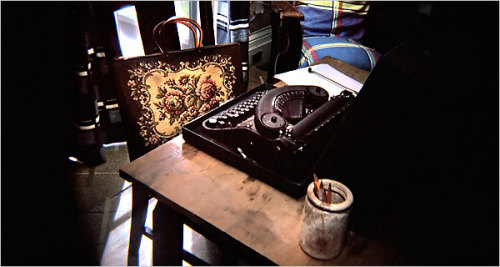 flannery's desk and typewriter
flannery's desk and typewriter
The Thing She Did Best
Somebody was telling me that Malcolm Cowley had delivered himself of an essay in the last Harper's magazine on the state of the novel. He didn't find them now as good as in the 30s when folks were protesting. I didn't rush out to buy one.
I hope if I am eating salt in august I can get to see you before you start off in the airplane. I don't make no plans.
- Flannery O'Connor in a letter to Robert and Sally Fitzgerald, 5/7/53
Before Milledgeville, Georgia was just another place for Ben Roethlisberger to degrade women, it was the country home of Flannery O'Connor, one of the finest writers we have known. Flannery wasn't exactly the most politically correct person, and her political and religious views held her apart from the hoity-toity cultural decacons of that age. Nevertheless, respect for her incomparable prose style and mastery of the short story form was generally acknowledged by her critics and her naysayers alike. She was a devout Catholic, and her faith in God sustained her through countless medical difficulties before she passed away from lupus at the age of 39. In her letters, she proves to be the among the sauciest pen pals of the era, and in the following excerpts, she reflects on her influences.
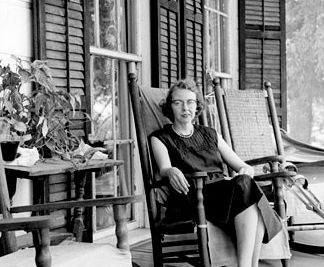
To Sally Fitzgerald
mid-September 1951
I certainly enjoyed Catcher in the Rye. Read it up the same day it came. Regina said I was going to RUIN MY EYES reading all that in one afternoon. I reckon that man owes a lot to Ring Lardner. Anyway he is very good. Regina said would she like to read it and I said, well it was very fine. She said yes but would she like to the read it, so I said she would have to try it and see. She hasn't tried it yet. She likes books with Frank Buck and a lot of wild animals.
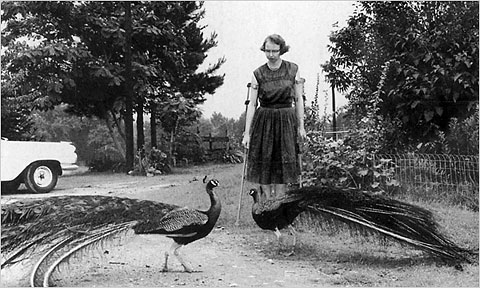
To Robert Lowell
2 May 1952
I was powerful glad to hear from you and I am pleased that you liked the gorilla. I hope you'll like the whole thing. I asked Bob Giroux to send you one.
I've been in Georgia with the buzzards for the last year and a half on acct. of arthritis but I am going to Conn. in June to see the Fitzgeralds. They have about a million children all with terrific names and all beautiful. I'm living with my mother in the country. She raises cows and I raise ducks and pheasants. The pheasant cock has horns and looks like some of those devilish people and dogs in Rousseau's paintings. I have been taking painting myself, painting mostly chickens and guineaus and pheasants. My mother thinks they're great stuff. She prefers me painting to me writing. She hasn't learned to love Mrs. Watts. Harcourt sent my book to Evelyn Waugh and his comment was: "If this is really the work of a young lady, it is a remarkable product." My mother was vastly insulted. She put the emphasis on if and lady. Does he suppose you're not a lady? she says. WHO is he?
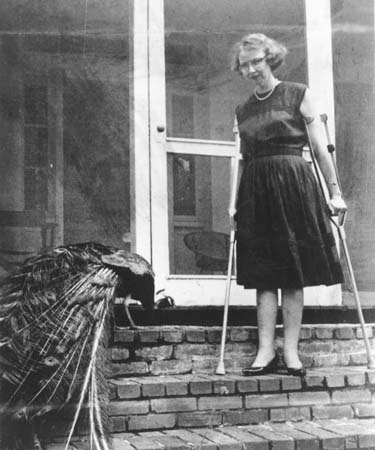
To Ben Griffith
13 February 1954
Thank you so very much for your kind letter. I am much more like Enoch than like the gorilla and I always answer every letter I get, at once, at length. This may be because I don't get many.
I don't know how to cure the source-itis except to tell you that I can discover a good many possible sources myself for Wise Blood but I am often embarrassed to find I read the sources after I had written the book. I have been exposed to Wordsworth's "Intimation" ode but that is all I can say about it. I have one of those food-chopper brains that nothing comes out of the way it comes in. The Oedipus business comes nearer home. Of course Haze Mote is not an Oedipus figure but there are the obvious resemblances. At the time I was writing the last of the book, I was living in Connecticut with the Robert Fitzgeralds. Robert Fitzgerald translated the Theban cycle with Dudley Fitts, and their translation of Oedipus Rex had just come out and I was much taken with it. Do you know the translation? I am not an authority on such things but I think it must be the best, and it certainly is very beautiful. Anyway, all I can say is, I did a lot of thinking about Oedipus.
My background and my inclinations are both Catholic and I think this is very apparent in the book. Something is usually said about Kafka in connection with Wise Blood but I have never succeeded in making my way through The Castle or The Trial and I wouldn't pretend to know anything about Kafka. I think reading a little of him perhaps makes you a bolder writer. My reading is botchy. I have what passes for an education in this day and time, but I am not deceived by it. I read Henry James, thinking this may affect my writing for the better without my knowing how. A touching faith, and I have others.
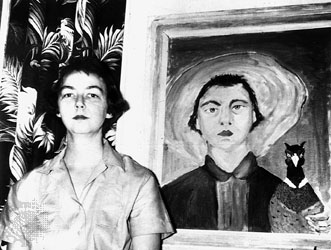
The following is excerpt from a letter to one of Flannery's longtime readers and letter correspondents in August of 1955:
I didn't really start to read until I went to Graduate School and then I began to read and write at the same time. When I went to Iowa I had never heard of Faulkner, Kafka, Joyce, much less read them. Then I began to read everything ay once, so much so that I didn't have time I suppose to be influenced by any one writer. I read all the Catholic novelists, Mauriac, Bernanos, Bloy, Greene, Waugh; I read all the nuts like Djuna Barnes and Dorothy Richardson and Va. Woolf (unfair to the dear lady, of course); I read the best Southern writers like Faulkner and the Tates, K.A. Porter, Eudora Welty and Peter Taylor; read the Russians, not Tolstoy so much as Doestoyevsky, Turgenev, Chekhov and Gogol. I became a great admirer of Conrad and have read almost all his fiction.
I have totally skipped such people as Dreiser, Anderson (except for a few stories) and Thomas Wolfe. I have learned something from Hawthorne, Flaubert, Balzac and something from Kafka, though I have never been able to finish one of his novels. I've read almost all of Henry James - from a sense of High Duty and because when I read James I feel something is happening to me, in slow motion but happening nevertheless. I admire Dr. Johnson's Lives of the Poets. But always the largest thing that looms up is The Humerous Tales of Edgar Allan Poe. I am sure he wrote them all while drunk too.
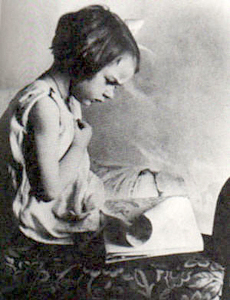 young flanneryTo Elizabeth Bishop
young flanneryTo Elizabeth Bishop
2 August 1959
I have at last got my novel out of the house and on the train and haven't yet self-employed myself back on anything serious. After you have worked on a thing seven years, it is too close for you to see it with precision. I see my stories much more clearly because they haven't exhausted me by the time I finish them. My book is about a boy who has been raised up in the backwoods by his great uncle to be a prophet. The book is about his struggle not to be a prophet - which he loses. I am resigned to the fact that I am going to be the book's greatest admirer.
Yesterday I sold a pair of peacocks, the first time I have sold any. These people showed up in a long white car, the woman in short shorts. They obviously had plenty of money that they weren't used to. She flew a Piper Cub, kept two coons, and what she called a "Weimeraw" dog. He was going to start in on pheasants, peafowl an dbullfrogs. They came in and admired the house and she said, "We was in Macon looking for some French provincial furniture. I want me a love seat." The man was a structural engineer. He said he had a friend who was a writer in Mississippi and I said who was that. He said, "His name is Bill Faulkner. I don't know if he's any good or not but he's a mighty nice fellow." I told him he was right good.
Flannery O'Connor died in 1964. You can purchase Flannery's selected letters, The Habit of Being, edited by Sally Fitzgerald, here.
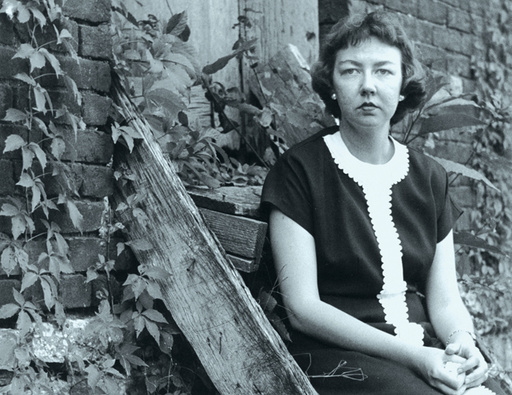
This Recording Presents How and Why to Write
Part One (Joyce Carol Oates, Gene Wolfe, Philip Levine, Thomas Pynchon, Gertrude Stein, Eudora Welty, Don DeLillo, Anton Chekhov, Mavis Gallant, Stanley Elkin)
Part Two (James Baldwin, Henry Miller, Toni Morrison, Kurt Vonnegut Jr., Margaret Atwood, Gertrude Stein, Vladimir Nabokov)
Part Three (W. Somerset Maugham, Langston Hughes, Marguerite Duras, George Orwell, John Ashbery, Susan Sontag, Robert Creeley, John Steinbeck)
Part Four (Flannery O'Connor, Charles Baxter, Joan Didion, William Butler Yeats, Lyn Hejinian, Jean Cocteau, Francine du Plessix Gray, Roberto Bolano)
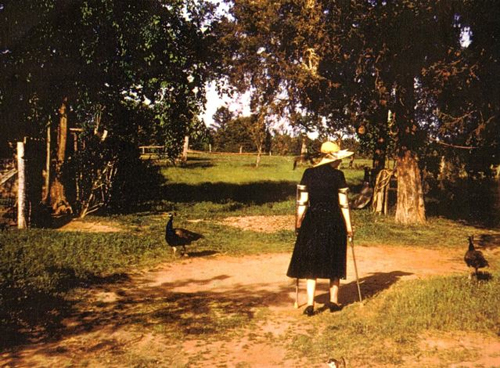
"So Sleepy" - Fiona Apple (mp3)
"Why Try To Change Me Now" - Fiona Apple (mp3)
"I Walk A Little Faster" - Fiona Apple (mp3)
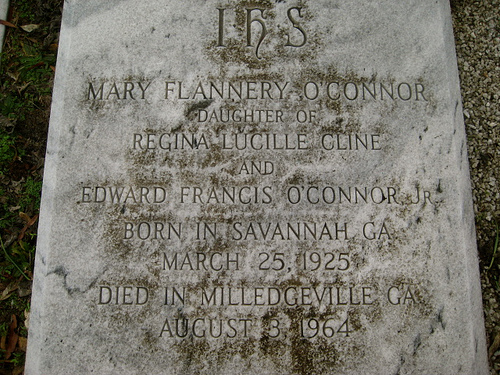
 flannery o'connor,
flannery o'connor,  henry james
henry james 





























Reader Comments (2)
"A touching faith, and I have others."
stupid perfect.
i'm going to give the violent bear it away another go right about now.
Excellent¡Breathtakingly vivid Pics and beautifully Words.
Kisses and Blessed Be¡